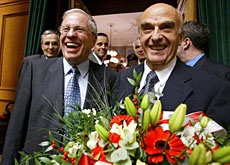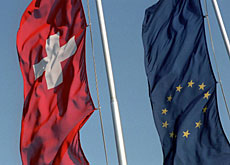
Blocher election complicates EU relations

Opinion is divided as to whether Christoph Blocher’s election to the government will have an impact on Switzerland’s relations with the European Union.
The arrival of the rightwing populist in office could threaten a set of bilateral agreements in force since June 2002.
Blocher is a hardline eurosceptic who, throughout his long political career, has campaigned against closer ties with Brussels.
In 1992 he helped fight a proposal to take Switzerland into the European Economic Area. The campaign forced the government to rethink its strategy of early EU membership and instead focus on achieving closer ties through bilateral agreements.
As a member of the seven-strong cabinet – whose official policy is still to join the EU – it could be difficult for Blocher to toe the line.
But Gregor Kündig of the Swiss Business Federation, economiesuisse, does not think Swiss-EU relations will be tested by Blocher’s election.
“Of course Blocher has always opposed Swiss entry to the EU,” he told swissinfo.
“This has to be discussed in government but basically I don’t expect it to affect relations between Bern and Brussels.”
“I expect the negotiations [on a second set of bilateral agreements] to go on for a while, and certainly the interests of Switzerland as a financial hub will be taken into account. But basically there cannot be much change.”
Bilaterals ties
Kündig’s comments may turn out to be wishful thinking, especially since Blocher has repeatedly criticised the government in its dealings with the EU.
The second set of bilaterals includes agreements on asylum and immigration policy, as well as cross-border taxation – all issues close to Blocher’s heart and on which he takes a typically hardline stance.
In addition, the future of an agreement on the free movement of people – part of the first set of bilaterals that came into force in 2002 – is by no means guaranteed.
It has to be negotiated individually with each of the ten new member states – and then be put to a nationwide vote.
Such a vote would be an important test of Blocher’s commitment to consensus politics, especially if collectively the government recommends a “yes” vote, while his own People’s Party says “no”.
Overreaction
Europe’s press was quick to jump on Blocher’s election, claiming it would strain relations between Switzerland and the EU and warning that Brussels would now be dealing with a much more eurosceptic government.
But Kündig insists that such a reaction does not take into account the reality of the way Swiss politics works and the importance of consensus in government.
“That’s always a problem when observing a country from a distance: the media always tends to overreact by giving the impression that there has been a much bigger change than has actually taken place,” he said.
“Of course the image of this country is important for the business community, but we don’t think the reliability of Switzerland as a business partner will suffer [from the press reaction].”
Diana Wallis, a British member of the European parliament, agrees that there has been a degree of overreaction in some quarters of the European press.
While she urges a “wait-and-see” policy before judging how Blocher’s election will influence Swiss-EU relations, Wallis also admits that Brussels is understandably concerned.
“Blocher is now part of the government and if you look at cases where opposition politicians have had to work within the confines of government, sometimes that modifies their views and behaviour,” she told swissinfo.
“Clearly to a degree it is going to be wait and see, but there must be an amount of nervousness from the EU side.”
swissinfo, Jonathan Summerton
Christoph Blocher unseated the centre-right Christian Democrat, Ruth Metzler, to win a seat in the seven-strong government.
In 1992 Blocher successfully campaigned against a proposal to take Switzerland into the European Economic Area.
A first set of bilateral agreements between Switzerland and the EU came into force in June 2002 and included a deal on the free movement of people.
In a November 2000 foreign policy statement, Switzerland stated its intention to join the European Union.

In compliance with the JTI standards
More: SWI swissinfo.ch certified by the Journalism Trust Initiative




































You can find an overview of ongoing debates with our journalists here . Please join us!
If you want to start a conversation about a topic raised in this article or want to report factual errors, email us at english@swissinfo.ch.